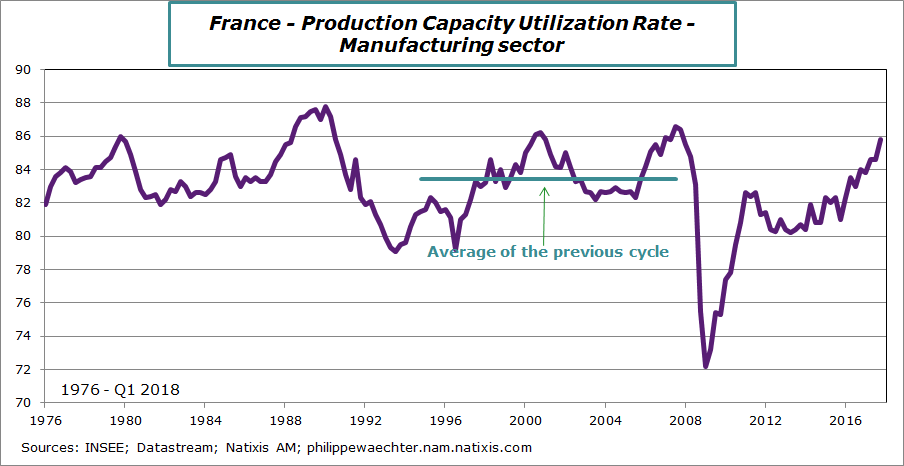The world balance is changing under the influence of China as it seeks to establish a different path for globalization. America is trying to stage a response at Davos with the White House realizing that America needs its partners in order to be great again. Meanwhile, French growth is running into physical obstacles: the 2% trend is a peak, at least in the short term.
. . .
We saw a surprising development in Davos last week when the US President backtracked on world trade and his global economy model, as the White House indicated that it no longer sees the economy as a zero-sum game, contrary to its stance so far. Going back to Trump’s inauguration speech a year ago, we will remember that he clearly talked about the need to bring all jobs back to the US, especially in industry, in order to benefit all Americans. This world view had a major impact on trade policy as a cooperative relationship with other countries or regions of the world was just not an option, and it is the emergence of this concept that dictates the likelihood of a trade war with a sharp surge in customs duties.
In his speech at Davos, Trump drastically changed his stance, stating “America first does not mean America alone”: in other words, the US cannot succeed by itself. This is a major shift from the White House. America cannot and must not neglect its longstanding partners if it wants to become great again.
This announcement is potentially inconsistent with the customs duty hikes implemented last week on solar panels and washing machines, ahead of other measures on aluminum and intellectual property.
An analysis of events at Davos suggests that the White House’s strategy has changed under pressure from China. Xi Jinping did not attend the forum in Switzerland, but the most intense discussions seem to have come from Chinese representatives. The aim is to develop and increase the effects of the “Belt and Road” program that China started in 2013, with the aim of making China the center of world trade. The question had been raised by Emmanuel Macron during his recent trip to China in a gesture to the Silk Road plan, while talks also took place in Davos on the development of this program in Latin America.
China wants to set up an international network that does not necessarily involve the World Trade Organization (WTO). Talks with France on the Silk Road seem to have been unilateral rather than bilateral, with China indicating what it sought and wanted. With this in mind, Donald Trump’s attitude with its trade partners could no longer be based on a zero-sum game as that would mean taking the risk of further isolating the US.
The power struggle is set to be between Washington and Beijing. Europe, as represented by President Macron’s fine speech in Davos, seems somewhat out of the picture. The French leader argued for global solutions to address various global macro questions such as pollution, distribution of wealth, terrorism and a number of other issues, and he is right to take this approach, but these do not necessarily seem to be the key concerns of these two giants, the US and China.
Europe must go beyond these principles and play its part in the conversation on the framework for world trade. For the moment, it seems somewhat detached, which is also why reforms are necessary.
. . .
The second point I wish to raise this week is French growth, which will be close to 2% in 2018, but the trend cannot conceivably go beyond this figure in the short term. The main reason is that French growth is coming up against its physical inability to go any faster.
The January 2018 INSEE business survey is very useful in this respect, reporting that hiring difficulties are increasing fast in industry, that production bottlenecks are growing and that the production capacity utilization rate cannot increase much beyond the current level as shown in the chart. The capacity utilization rate is close to its cycle highs and machinery and equipment cannot produce more than they already do.
This reflects the need for investment in order to ease pressure on French production equipment. Hiring difficulties are an indication that planned training and education measures need to be implemented quickly. Meanwhile, these figures also show that France will need to look for resources outside the country in the short term if pressure on production is to be eased.
France is paying the price of its sluggish momentum since 2011. In a fast-changing world, France sometimes seems to have stood still and suffered a lag. In this period when History is picking up speed, pressure on production equipment means that fresh momentum is required and the country needs to step onto a higher growth path than is usually witnessed. In view of the new global equilibrium set between the US and China, along with the major role now played by emerging countries and current technological innovation and digitalization, responsiveness and determination will be the watchwords.
So it is vital to be able to adjust quickly. This is particularly important because France, along with other developed countries, is now seeing weaker trend growth, with figures much lower than before the 2008 crisis. It is therefore important to pay particular attention to the context and make the necessary changes country-wide in order to take advantage of any signs of growth.
France must play its full part in this change if it is to continue to be a strong and influential economy. Labor market decrees are a step in this direction and the new system for establishing contractual termination by mutual consent at collective level also fits with this approach whereby changes can be made more easily.
Companies must be able to react very quickly to adjust their production set-up to an ever faster-changing world order.



